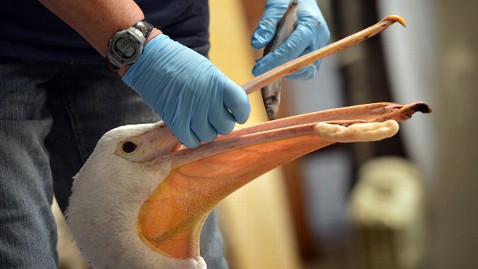California Pelican With Bent Beak Survives First-of-its-Kind Surgery

Nigel the pelican being fed after surgery. Image: The Orange County Register/Zuma.
A California pelican with life-threatening injuries and a bent beak has made a remarkable recovery after first-of-its-kind surgery.
Just a week ago the American White Pelican, nicknamed Nigel, was struggling to stay alive after he had become tangled in fishing line and lure near the California coast.
"A call came in because he had fishing line and lure around his wing, which made it difficult for him to feed," said technician Lyssa Holmes of the Wetlands and Wildlife Care Center in Huntington Beach, Calif.
Nigel's beak was badly bent and he had lost weight. His pouch was also ripped by a fishing hook.
"He could fly a little, so it took a couple of days to capture him," she said.
Nigel was brought to the care center, where workers removed the tangled fishing line and hooks. Due to his life threatening condition, the care center reached out to the VCA All-Care Animal Referral Center for help. On Saturday, veterinary surgeon Marcos Unis went to evaluate the bird.
"The bird was in really bad shape," Unis told ABC News. "The jaw was not only fractured but also deviated to the right side from the hook and fishing line pulling on the jaw. It was like having a lower jaw completely separated from the upper jaw."
Unis talked with colleagues about what their options were, and by Sunday, they were ready to perform surgery.
The procedure had never been done before. Unis used a combination of stainless steel surgical bone screws and acrylic cement to realign Nigel's jaw.
"I placed the screws into the beak and once it was in a normal position, I used acrylic bone cement to hold it in place," Unis told ABC News. "For this procedure, most of the guys get put down when they find them like this."
While it is unclear how well he may ultimately recover, Nigel is now in good health, eating up to eight to ten pounds of fish a day.
"The bird is doing great," Holmes told ABC News. "He's a juvenile, he's spunky, he's eating well. He'll have his external fixtures for at least eight weeks and will be on medication until then."
Unis said the screws will stay in for six weeks. By the end of two months, he hopes for a full recovery.
"If this works, hopefully we can use this technique to help other birds," Unis said.
However, the procedure will be costly for the non-profit care center. Furthermore, Unis said all could have been avoided if people were wary of disposing fishing lines.
"It's unfortunate that these injuries have to occur, but it's because people aren't careful with their fishing lines. It's important that when people are out fishing, they make sure they dispose of them."